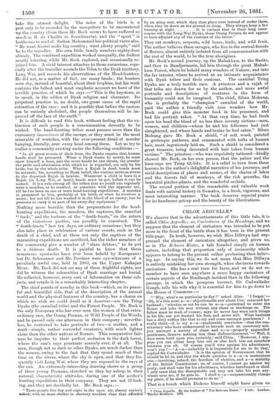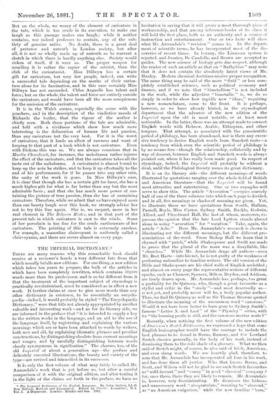CHLOE ARGUELLE.*
WE observe that in the advertisements of this little tale, it is called Chloe Arguello ; or, Caricatures of the Humbugs, and we suppose that the element of caricature was intended to be put more in the front of the battle than it has been in the present title-page. In truth, however, we wish Miss Dillwyn had sup- pressed the element of caricature altogether, and given us, as in The Rebecca Rioter, a tale founded simply on human nature, including that proportion only of insincerity which appears to belong to the present rather professing than believ- ing age. In saying this, we do- not mean that Miss Dillwyn is entirely mistaking her own strength, when she turns towards caricature. She has a real turn for farce, and we do not re- member to have seen anywhere a more happy caricature of certain aspects of the Bradlaugh incident than in the following passage, in which the pompous baronet, Sir Cadwallader Gough, tells his wife why it is essential for him to go down to the House of Commons :- "` Why, what's on particular to-day ?' asked Alice. I forget.'— 'Oh, it's this most a—a --objectionable row about Cox,' returned her husband ; whether or not he can be a—a—permitted to enter the House and take his seat without any shoes or stockings on. The fellow must be mad, of course; says he never has worn such things in his life, nor yet washed his feet, and never will. What business has a dirty ruffian like that to try and come amongst gentlemen ? I really think—it is my a—a—unalterable conviction—that the con- stituency who have endeavoured to intrude such an unsavoury sub- ject amongst a society of clean and a—a—properly apparelled gentlemen, deserve nothing less than disfranchisement:— Well, it does seem hard upon you, certainly,' said Chloe. However, I sup- pose you can either keep him out or else kick him out somehow between you all. Of course you'll vote against his admittance, won't you ?'—' A—a—unluckily it is impossible for me to do that,' replied Sir Cadwallader. It is the opinion of Government that he should be let in, and that the whole question is a—a—a momentous one,—involving, indeed, the freedom of election, and a—a stability of the British Constitution ; so, of course, I cannot go against my party, and shall vote for his admittance, whether barefooted or shod. I only trust that the disreputable cad may not take his seat any- where near me, if he gets in. I shall a—a—unquestionably change my place, if he should presume to do so.' "
That is a touch which Dickens himself might have given us.
• Chloe Arguelle. By the Author of "The Rebecca Rioter." 2 roll. London : Tinsley Brothers. 1581.
But on the whole, we weary of the element of caricature in the tale, which is too crude in its execution, to make one laugh as this passage makes one laugh ; while it neither contains, nor indeed professes to contain, any of the sub- tlety of genuine satire. No doubt, there is a great deal of pretence and untruth in London society, but after all, it is not so wholly made up of untruth as to warrant a sketch in which there is hardly anything else. Society would sicken of itself, if it were so. The proper weapon for assailing it is rather the rapier of the satirist, than the club of the caricaturist. Miss Dillwyn has a certain gift for caricature, but very few people, indeed, can write a successful tale depending on the - merits of their carica- ture alone for its fascination, and in this case certainly Miss Dillwyn has not succeeded. Chloe Arguelle has talent and force; but on the whole, the talent and force are entirely outside the caricature, and would have been all the more conspicuous for the omission of the caricature.
It is in the Welsh scenes, especially the scene with the poachers, and in the description of the vindictive moods of Richards the butler, that the vigour of the author is chiefly seen. Both these portions of the tale are admirable, and told with a vividness which show how much more interesting is the delineation of human life and passion, than any caricature but the very best. For it is the worst of caricature, that it lends an effect of rawness and want of keeping to that part of a book which is not caricature. Even with Dickens this was so. We are always conscious that in Martin Chuzzlewit, for instance, the melodrama rather injures the effect of the caricature, and that the caricature takes all the taste out of the melodrama. A caricaturist is almost bound to keep up the note he strikes, and to keep it up effectually to the end of his performance, for if he passes into any other vein, the unity of the work is gone. In Miss Dillwyn's case, it is clear that though she has a certain gift for farce, she has a much higher gift for what is far better than any but the most admirable farce ; and that she has much more power of sus- taining the picture of true passion, than she has of sustaining caricature. Therefore, while we admit that we have enjoyed more than one hearty laugh over this book, we strongly advise her not to try this line again. She is, we suspect, more in her real element in The Rebecca Rioter, and in that part of the present tale in which caricature is cast to the winds. Some of her porcelain is too fine for the crude earthenware of her caricature. The printing of this tale is extremely careless. For example, a masculine clairvoyant is uniformly called a clairvoyante, and there are errors almost on every page.



































 Previous page
Previous page